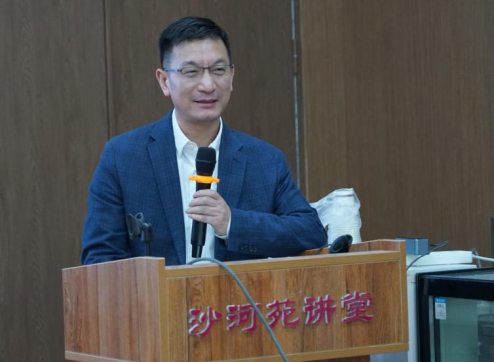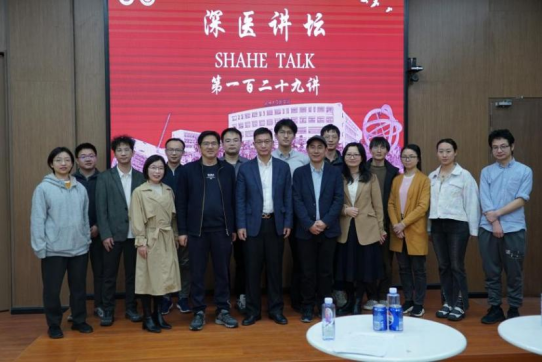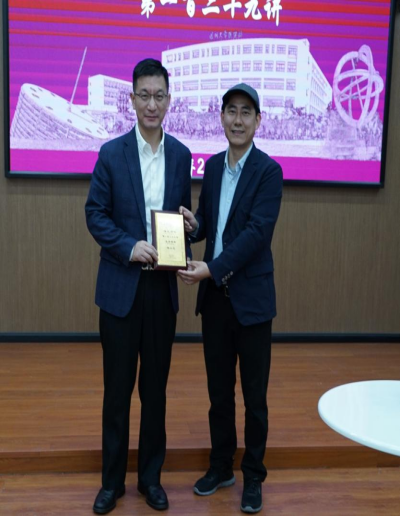Shenzhen University Medicine Forum: Cancer Theranostics
On February 24, 2025, ProfessorXiaoyuanChen from the National University of Singapore (NUS) delivered a lecture titled "Cancer Theranostics" atthe Lihu Campus of Shenzhen University. Hosted byProfessorPeng Huangfrom the School of Biomedical Engineering,Shenzhen University Medical School, this talk markedthe129thlecture of the Shenzhen University Medicine Forum.

During his lecture, Professor Chen elaborated on the concept of theranostics, highlighting its role in integrating molecular imaging and targeted therapy to achieve personalized treatment. He emphasized the clinical success of radiotheranostics, particularly the FDA-approved peptide receptor radionuclide therapy (PRRT) drug Lutathera, used for treating neuroendocrine tumors.
In the field of nanomedicine, Professor Chen showcased the development of albumin-based drug carriers, designed to improve tumor targeting and pharmacokinetics. He presented data from Phase I/II clinical trials demonstrating their efficacy in gastric and prostate cancers. Additionally, he discussed advancements in mRNA delivery systems, focusing on lipid nanoparticles (LNPs) engineered for lymph node-targeted cancer vaccines. Case studies included the dose-escalation trial of ¹⁷⁷Lu-LNC1004 for radioiodine-refractory thyroid cancer and the dual diagnostic-therapeutic application of ¹⁷⁷Lu-EB-FAPI in metastatic tumors, which illustrate the translational potential of these emerging technologies.
To conclude, Professor Chen proposed multimodal strategies that integrate nanomedicine, mRNA therapeutics, and conventional cancer treatments. His lecture sparked discussions on challenges in clinical translation and toxicity management of nanomedicines, engaging both faculty and students in an insightful exchange of ideas.

Brief introduction tothe Speaker:
Professor Xiaoyuan Chen is the Nasrat Muzayyin Endowed Chair Professor at the Yong Loo Lin School of Medicine and the Faculty of Engineering, National University of Singapore (NUS). A distinguished researcher in molecular imaging, nanomedicine, and theranostics, he is a Fellow of the Singapore National Academy of Sciences (SNAS), Academia Europaea, and the European Academy of Sciences.
Professor Chen obtained his Bachelor’s and Master’s degrees in Chemistry from Nanjing University in 1993 and 1996, respectively, and earned his Ph.D. from the University of Idaho, USA, in 1999. After postdoctoral training at Syracuse University and Washington University in St. Louis, he joined the Department of Radiology at the University of Southern California as an Assistant Professor in 2002. He later moved to Stanford University in 2004, where he was promoted toAssociate Professor in 2008. In 2009, he joined the National Institute of Biomedical Imaging and Bioengineering (NIBIB) at the National Institutes of Health (NIH), as a Senior Investigator and Director of the Molecular Imaging and Nanomedicine Laboratory. Since 2020, he has been part of NUS, holding the Nasrat Muzayyin Endowed Chair Professorship. His accolades include the NIBIB Mentor Award (2012), NIH Director’s Award (2014), ACS Bioconjugate Chemistry Lecturer Award (2016), Society of Nuclear Medicine and Molecular Imaging (SNMMI) Michael J. Welch Award (2019), and JNB Trailblazer Award. He is also a Fellow of the American Institute for Medical and Biological Engineering (AIMBE) and the SNMMI. As a leading figure in theranostics, Professor Chen serves as an editorial board member for prestigious journals such as Accounts of Chemical Research (Acc Chem Res) and ACS Nano, and is the founding Editor-in-Chief of Theranostics (impact factor 12.4) and ACS Nano Medicine. He has held leadership roles as the former chair of the Chinese-American Society of Nuclear Medicine and Molecular Imaging (CASNMMI), the Chinese-American Society of Nanomedicine and Nanobiotechnology (CASNN), and the Radiopharmaceutical Science Council (RPSC) of the SNMMI. Professor Chen’s research focuses on in vitro diagnostics, in vivo imaging, nano-delivery systems for genes and drugs, and theranostics. With over 1,000 SCI-indexed publications (H-index 207, nearly 160,000 citations), he has received multiple international honors for his groundbreaking contributions to the field.

Professor Peng Huang presented Professor Xiaoyuan Chen with the "Shenzhen University Medicine Forum" Honorary Medal








用户登录
还没有账号?
立即注册